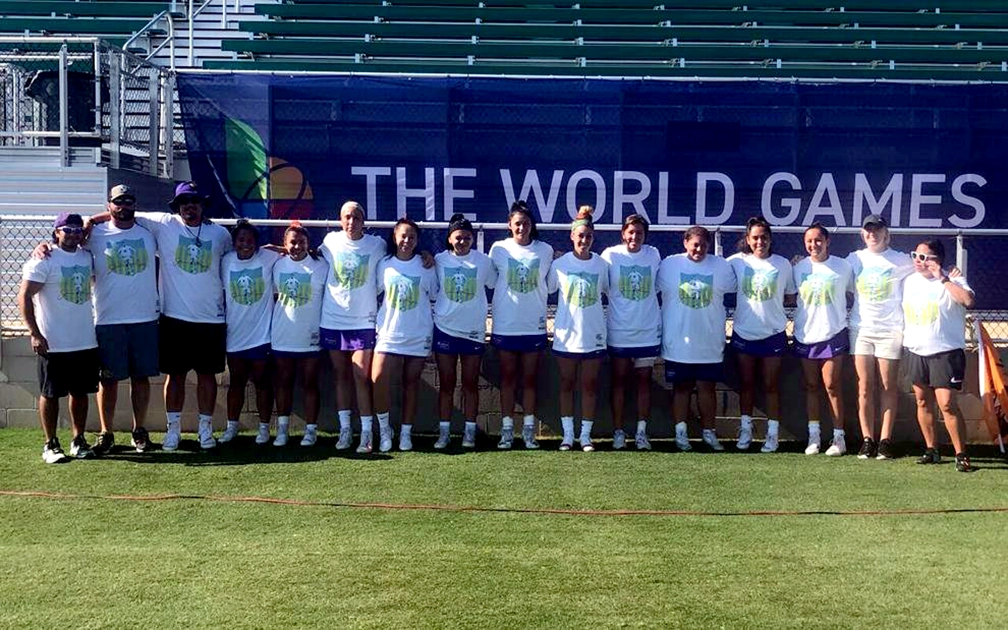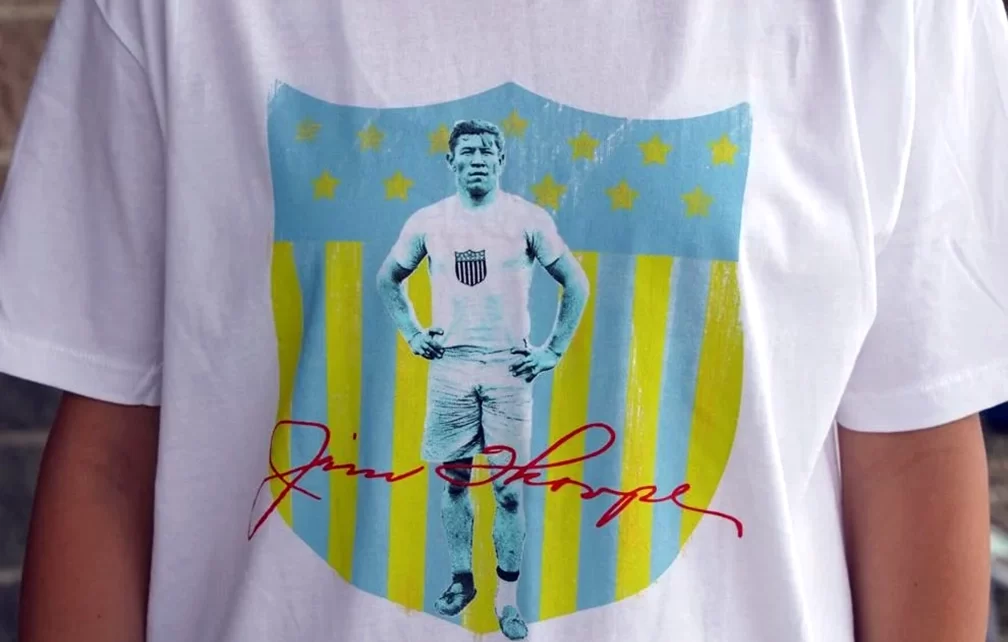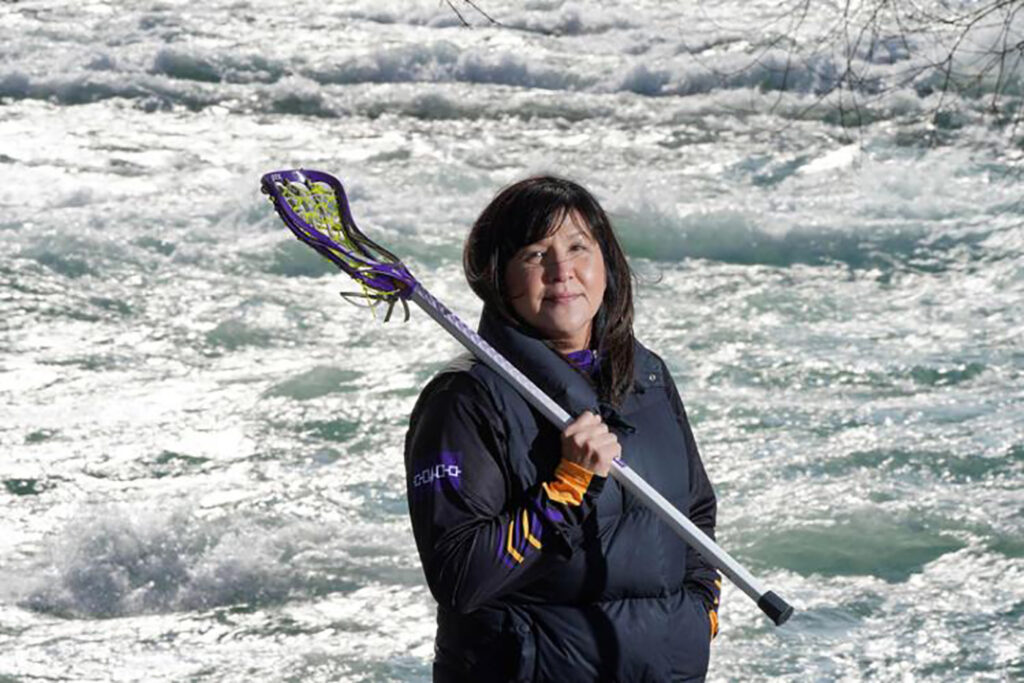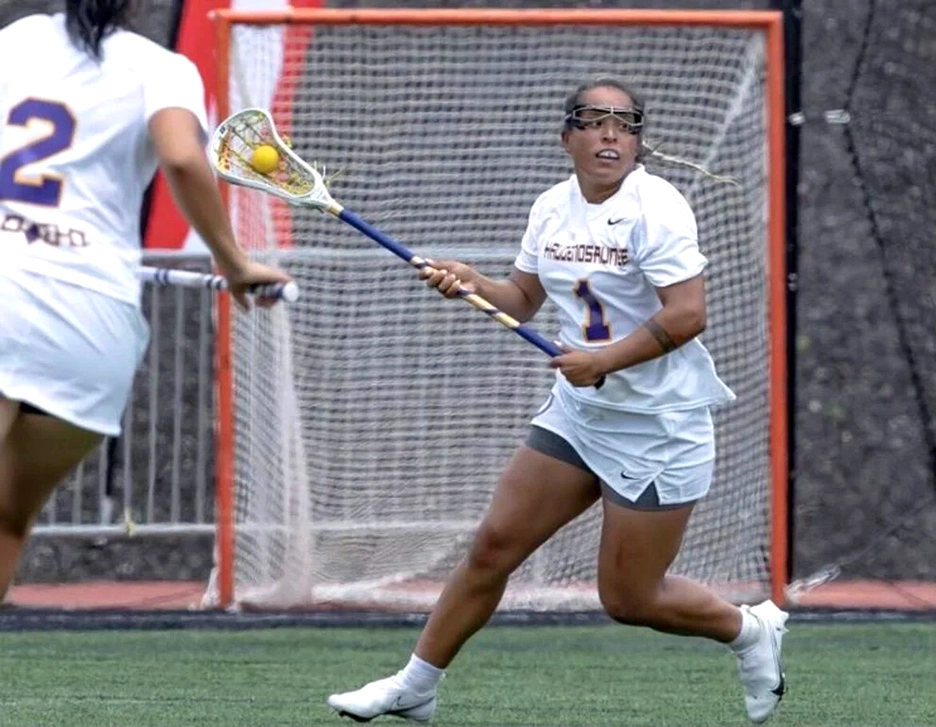August 13, 2022 | By Sean Kirst | buffalonews.com
Above: Haudenosaunee Nationals women’s lacrosse team players wore these Jim Thorpe warm-up shirts before they played against the Czech Republic in the World Games, in July. Photo credit: Mark Mulville/Buffalo News
Nedra Darling was in a Whole Foods parking lot last month in Maryland, after buying snacks for the Haudenosaunee Nationals women’s lacrosse team, when she found out that her Olympic dream for the great Jim Thorpe had come to be.
While those players were on a world stage and nurturing an historic Olympic vision of their own, Darling could not tell them about Thorpe.
Not quite yet.
Darling, of the Prairie Band Potawatomi Nation, is public relations director for the women of the Haudenosaunee, or Six Nations, whose international team and staff is rich with representation from native territories in Western New York. She is also a co-founder of Bright Path Strong, an organization inspired by Thorpe’s legacy that builds upon the meaning of his native name.
Those connections helped Darling forge a tight bond with Claudia Jimerson, a Cayuga raised at the Seneca Nation who is director of women’s lacrosse operations for the Haudenosaunee Nationals, a groundbreaking native program in international lacrosse.

In July, the women’s team went straight from finishing eighth of 29 teams in the lacrosse world championships in Maryland to competing, like their Haudenosaunee men’s counterparts, in the prestigious World Games in Birmingham, Ala.
Even as they settled in, Darling had to keep secret what she had just learned about Thorpe, who was born into the Sac and Fox Nation of Oklahoma and became one of the greatest athletes in history. He was a Major League Baseball player and a legend of collegiate and pro football. But he earned worldwide fame by earning gold medals in the pentathlon and decathlon at the 1912 Olympics, an ultimate test of track and field skill and endurance.

Thorpe lost those medals less than a year later, based on a ruling that he violated qualifying rules on amateurism by playing semipro baseball for a few dollars a game. As The New York Times recalls, even the silver medalists did not feel they deserved Thorpe’s gold. But the situation went unchanged until the International Olympic Committee – responding to decades of protest about bias and disproportionate penalties – finally began listing him as a co-champion in 1982.
To Darling and many allies, that decision was not justice. Thorpe won those events, and they wanted him acknowledged as an undisputed gold medalist. Darling, also an executive producer of a new film about Thorpe, started a petition seeking that change. It quickly attracted tens of thousands of signatures, and the message she received in that parking lot last month provided one of the great moments of her life.
One hundred and 10 years after Thorpe won his medals, the IOC gave him back his ranking as sole rightful champion.
“We were so thrilled the IOC came to this decision, that they righted these wrongs,” Darling said. That day, when she rejoined the Haudenosaunee team, she was so visibly elated by what just happened that Jimerson looked at her and said:
“Are you OK?”
Darling said she had great news she could not yet reveal, and Jimerson – aware of the quest – quickly understood. She agreed with Darling’s conclusion: “The Creator has been with us this whole time.”
The decision could not be publicly revealed until a formal announcement later that week. Darling and Jimerson would have to wait until then to tell the players.
As it turned out, that is exactly when the team needed to hear it.
The Haudenosaunee women, after playing in fierce summer heat at the world championships in Maryland, had scant time to rest before the World Games in Alabama. A threshold opportunity was also an exhausting challenge: While they would play in that global event for the first time, they did not have a large enough pool of available players to substitute “fresh legs” onto their roster, as many nations did as a way of coping with back-to-back tournaments at brutal temperatures.
The weary Haudenosaunee team lost its first few World Games contests. That included a particularly frustrating overtime defeat to Great Britain, after the Seneca Nation’s Ivy Santana took a beautiful pass from Miya Scanlan, a fellow Seneca, and tied the score just as time ran out in regulation.
On the night before their final game against the Czech Republic, in a group message with Jimerson, the players learned Thorpe’s gold medals had been fully restored. The men’s team was already done, finishing fifth, meaning any immediate Haudenosaunee response to that revelation on a World Games field would need to come from the women.
Jimerson spoke of the ruling and its significance. She told the team how Darling was “overnighting” a stack of Bright Path T-shirts, featuring an image of Thorpe, to wear as high-profile warmups before the game.
The timing, they all agreed, went beyond coincidence. Liz Beville, the Nationals coach, said she was constantly impressed by a message about Haudenosaunee culture that her players emphasized throughout this summer of high-level competition.
“They wanted to educate people,” Beville said. “They want everyone to understand that they’re still here.”
What Thorpe’s story illustrates, said Lois Garlow – a Seneca and one of the team’s co-captains – “is that we play for a greater purpose than ourselves.”
The buildup had already been emotional. Reaching Birmingham was originally a struggle in itself, occurring only after Ireland Lacrosse – now hosting the men’s 21-and-under international championships – gave up its own spots so the Haudenosaunee, whose people created the game, would not be excluded.
Earlier in that week, the Haudenosaunee and Canadian women’s World Games teams walked onto the field side-by-side, wearing T-shirts that honored and remembered native children whose remains have been found in unmarked graves at now-closed Canadian residential schools – institutions that attempted to strip those girls and boys of their culture and identity.
A day or so later, the players learned the news about Thorpe.
Here was a Native athlete diminished for all too long receiving full Olympic redemption at the exact moment the Haudenosaunee were finally at the World Games – which they see as a major step toward a potential Olympic presence in lacrosse in Los Angeles, in 2028.
A week before, at the international tourney in Maryland overseen by World Lacrosse, the Haudenosaunee women had lost to the Czech Republic. This time, in their final appearance in the World Games, the outcome was reversed.
“The person we were playing for was Jim Thorpe,” Santana said. “You could feel it.”
The team fought through its fatigue for an emotional 13-8 victory. Jacelyn Lazore, a Mohawk of Akwesasne, scored six goals, and co-captain Jayln Jimerson, of the Cayuga Nation, had two goals and two assists. While grateful for the victory, Jimerson said she has thought a lot in the last few weeks about the larger meaning of being there at all.
There was the idea of playing for her Haudenosaunee people, “the name I wear across my chest,” and the statement it provides about community, faith and resilience. There was the power of representing a Native game her people gave to the world, the responsibility of “playing for the Creator, and playing for the good mind, and playing for all those people who can’t.”
And then came this last-minute revelation about Thorpe. All the players I spoke with said they grew up knowing his story, how he made such a triumphant statement on the Olympic stage before his name was physically wiped from the record books. That narrative, all too familiar to Native people, was officially reversed only hours before the Haudenosaunee women took the field to notch that big international win.
The players saw it as a gift: They had been given a chance, in a global sports spotlight, to respond on behalf of the Indigenous world.
“It was like he did it on purpose,” Garlow said. “We all felt like Jim Thorpe was watching us.”







